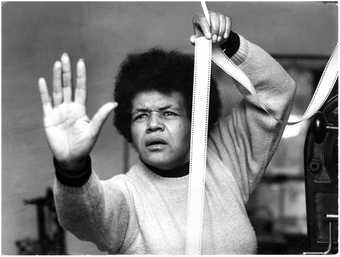Organised to coincide with Tate’s exhibition Surrealism Beyond Borders, Tate and SOAS University of London present two days of screenings dedicated to the late artist's films.
Maldoror’s revolutionary interests went hand in hand with Surrealism’s idea of championing the irrational, as well as its commitment to social and political liberation. She also changed her last name Ducados to Maldoror, as a tribute to Lautreamont’s Les Chants de Maldoror (The Songs of Maldoror) 1868–9, a key reference for many Surrealist artists and authors.
As part of the Tate Late film programme, two portrait films highlight her connections to the Surrealist circle in Paris.
Programme
- Sarah Maldoror, Wifredo Lam, 1981, (16 mm film, transferred to video), sound, 4 minutes, French with English subtitles
- Sarah Maldoror, Louis Aragon, Un masque à Paris (Louis Aragon, A Mask in Paris), 1981, (16 mm film, transferred to video), sound, 20 minutes, French with English subtitles
Wifredo Lam
This documentary is dedicated to Wifredo Lam’s (1902–1982) 1980 exhibition of paintings and sculptures at the Artcurial gallery in Paris. Lam was a Cuban-born artist of mixed Afro-Cuban and Chinese heritage. After moving to Paris in the late 1930s, he became an active member of the Surrealist movement. Interested in Surrealism’s exploration of the subconscious, he delved into Afro-Cuban religious cultures. He saw in his art a way to reclaim the dignity of his mixed African heritage. ‘My painting is an act of decolonization not in a physical sense, but in a mental one,’ he stated. In the film, Maldoror emphasises Lam’s interest in African heritage as well as the uncanniness of his work. It is a striking homage to an artist she knew and had collaborated with. Lam had been commissioned to realise the poster for Jean Paul Sartre’s No Exit (Huis Clos), the first play performed by Maldoror’s theatre company, Les Griots, in 1956.
Louis Aragon, Un masque à Paris
In this film, Maldoror draws an unconventional portrait of poet Louis Aragon (1897–1982). A major figure of French literature, Aragon established the Paris version of Dada with André Breton and Philippe Soupault in 1919. He then became one of the key Surrealist writers in France. Aragon’s life-long commitment to radical politics concurred with his editorial practice, his poetics associated to an act of freedom. Set in his apartment in Paris, the film follows Aragon, as he is interviewed by Maldoror and improvises reading author Jean Ristat’s texts. Maldoror paints a nuanced picture of the poet: intimate, poetic, at times vulnerable, but never devoid of humour. One gets to wonder what is hidden behind the mask; or revealed through it.

